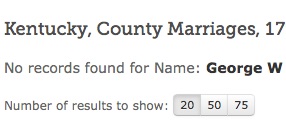 As someone who tries to be an organized genealogist, I think one of the hardest things to remember to do is to make a note of my fruitless searches. When you do a search and get no results, the natural thing to do is to plow ahead and tweak the search and try again or to try searching another collection (or another ancestor).
As someone who tries to be an organized genealogist, I think one of the hardest things to remember to do is to make a note of my fruitless searches. When you do a search and get no results, the natural thing to do is to plow ahead and tweak the search and try again or to try searching another collection (or another ancestor).
But if you take the time to document that negative search, you might save yourself from duplicating that fruitless search in the near future (and therefore save yourself some time).
To me, the tricky part is figuring out how to record it. If you’re faithful about a research log (high five!), it seems fairly straightforward to include it in your log.
But if you’re one of those people (and I have to admit to being one of them) who doesn’t record everything faithfully in a log, you might have to devise a system specifically for negative research.
Here’s what I’m going to try. Using Evernote, I’ve created a Negative Research notebook in my Genealogy stack. I’ll try to remember to create a note when I spend time on fruitless research, making note of what I searched for and where, what the results were and when I did the search. By putting surnames in the note, I’ll easily be able to access the note on a simple search in Evernote, if I’m looking for information I stored there on a specific family member.
One caveat: I’m often searching sites like Ancestry.com or FamilySearch.org, so I need to bear in mind that they’re constantly adding new collections. So just because a search came up blank one day doesn’t mean that it won’t bear fruit a year (or more or less) down the road. Periodically, I’ll try to remember to check out my Negative Research notebook and see if it’s time to try that search again.
I’m hopeful this system will help me save precious research time.
How about you? Do you record your negative research? If so, how do you do it?

Like you, I’m trying to be better about recording my negative research. I have been recording it in an individual’s “Tasks” tab in Family Tree Maker. My information includes the date I looked, type of information (i.e. burial, marriage, etc.), source and databases used, and sometimes a comment such as “no record” or “possible but needs further research”.
Thanks for commenting, Mary. That sounds like an excellent place to keep that info!
In Reunion, usually I attach “successful” census citations to a person’s birth — since the census usually says something about the birth. For a negative search, I typically add a source citation to his birth event that might say “Can’t find him in 1880 in PA, OH, or WV,” so it appears with the others. It’s a kind of red flag for me that stays “in my face.” But I admit that quicky statements like that aren’t so good for less commonly used sources — I would need to spell out a real citation.
Interesting, Marian! Thanks for sharing that. I think I would worry about cluttering up my sources in Reunion if I used a source citation for negative research. But it’s food for thought!
Yes, it does make for a lot of citations — but I use my database to support my research more than for generating a report that others will want to see. And maybe others would benefit from seeing the negative stuff, too.
That’s a very good point. I have to admit, I never think about my research in terms of how others would see it. I was more concerned about cluttering it up for my own sake, but I’m probably a bit more sensitive to clutter than some people. I will definitely consider ways to use Reunion to track this stuff, thanks to your comments as well as Mary’s. Thank you!
I am starting to record my negative searches. My source citations are abbreviated sufficient to enable me to find again from where the info comes. Most of my data is stored in a spreadsheet; I periodically upload it to Family Tree Builder (one of the reasons I like FTB). I put negative results in the spreadsheet (Can’t find DofB from 1865-1920 in VBMD. VBMD stands for Victorian Births Marriages and Deaths Index.)
I am currently working on the Australian Electoral Rolls for Victoria (VIC ELEC). I have a “log” for these. In the log, I have what I’m searching for, and also what I’ve tried searching for with negative results.
Both are working well
Im full of admiration for your organisation skills.
Me too!
That sounds like a great system for you, John. Thank you so much for sharing it!!
Back in the days when I actually went to repositories to do research, I used Research Extracts to record both negative and positive results for each record and/or source. I don’t record negative results for Ancestry.com or FamilySearch.org searches since new records are added daily.
You make a good point about Ancestry and FamilySearch updating their records constantly. It hadn’t occurred to me to just not worry about recording those searches. My motto is “Let it be easy” and I think this is a good example of that. Thank you!